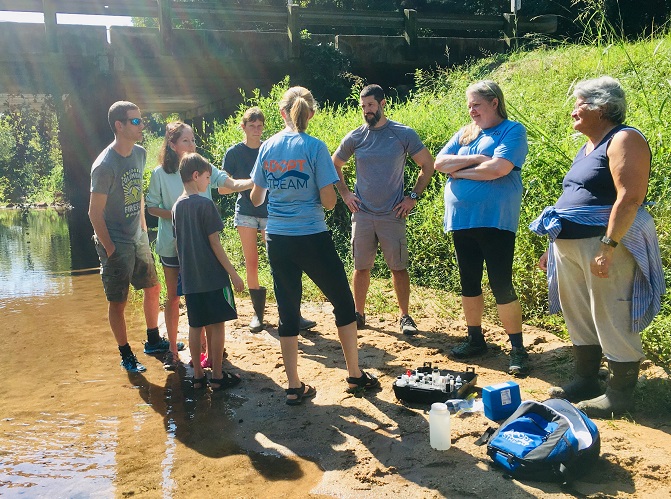SC Adopt-a-Stream Program Celebrates Successes on Its 5th Anniversary, Seeks More Volunteers to Protect Local Waterways
FOR IMMEDIATE RELEASE:
August 16, 2022
COLUMBIA, S.C. ― The South Carolina Adopt-a-Stream volunteer program for monitoring water quality is celebrating five years of protecting waterways across the state. The program, which is supported by local volunteers who understand the importance of healthy watersheds, has had many successes over the past five years and looks to have many more in the future.
First launched in South Carolina in 2017, the South Carolina Adopt-a-Stream program (SC AAS) is managed by a partnership between the South Carolina Department of Health and Environmental Control (DHEC) and the Clemson University Center for Watershed Excellence (CU CWE). To date, SC AAS volunteers have conducted more than 3,000 sampling events at streams around the state. That water sample data provides key information about stream conditions and helps guide volunteers, educators, conservation groups, and local governments on how they can partner together to protect and restore polluted waterways. The data volunteers collect are available to the public without any required log in through the SC AAS database.

South Carolina Adopt-a-Stream volunteers discuss water quality at a free training workshop. Volunteers must first become certified, during which they learn how to measure water quality and what behaviors and land-use changes can impact waterway health.
“Our state’s SC Adopt-a-Stream volunteers are at the heart of this program and are what make it such a success,” said Sierra Hylton, DHEC’s SC Adopt-a-Stream Program Coordinator. “Through free trainings and workshops, our volunteers learn how to collect samples and understand water quality data. Our volunteer data provides impressive quantitative results that help create partnerships at the local level for protecting and restoring waterways. In turn, our volunteers become conservation advocates within their communities.”
Data collected by SC AAS volunteers have helped identify broken sewer pipes, broken water lines, and sedimentation issues. Detecting these problems early on helps local governments and other entities save time, resources and money to fix the issues at their source before their impacts become widespread or costly.
“Community science is changing the way we manage our natural resources worldwide and how we engage our public in their smart management,” said Katie Callahan, director of Clemson University’s Center for Watershed Excellence. "More eyes and ears outside can share powerful observations that through programs like SC Adopt-a-Stream, activate local authorities when the threat of pollution is observed. Free trainings and a less complicated database of results and photos democratizes environmental health data and encourages more broad participation in the decisions that affect our communities. We at the Center are grateful to be a player in such a powerful program for our state and waterways,”
Some recent SC AAS successes include:
- Anderson County: Volunteer Trey Burns began noticing elevated bacteria levels at his monitoring site in Hembree Creek. After recording numerous high-bacteria sampling events, Trey discovered a broken pipe near the stream. The appropriate local officials were notified and immediately responded to fix the pipe. This was an important discovery as Hembree Creek flows into Lake Hartwell, just above a source water intake.
- Travelers Rest: Volunteer Gerardo Naundorf noticed unusual odors and excessive sediment accumulating at a nearby stream. After notifying DHEC’s regional Environmental Affairs office, the property owner was contacted and was very grateful that the condition of that section of stream was brought to their attention. The property owner took the necessary actions to improve the water quality, including installing silt fencing along ditches. This action has led to a significant reduction in sediment along the North Saluda River.
- Gills Creek (Columbia): Volunteer Trish Jerman with the Gills Creek Watershed Association noticed bacteria levels dropped to zero at one of her long-term monitoring sites and the water smelled of chlorine. SC AAS staff met Trish at her site, and local authorities were soon contacted after which a drinking water line break was found. Local officials quickly repaired the line, and subsequent testing at that site found the bacteria levels were back to normal, and damselfly larva were present – a natural indication of healthy water quality.
SC AAS volunteers have been recognized by Gov. Henry McMaster, mayors, county councils, public water utilities, conservation groups, local businesses, and many others for their efforts to study, advocate for, and protect South Carolina’s irreplaceable waterways.
Both DHEC and the CU CWE encourage anyone with an interest in SC AAS to learn more. There are various ways to volunteer and support this water monitoring program in your community.
Information about how to become a volunteer, where and when training workshops take place, and additional information is available at scadoptastream.org or by contacting Sierra Hylton at hyltonsf@dhec.sc.gov or Emily Anderson at esa2@clemson.edu.
###
The SC AAS program, co-led by DHEC and CU CWE, is supported by many other organizations, including: Kalmia Gardens, Charleston Waterkeeper, Baruch Institute, Department of Natural Resources, NOAA, Coker University, USC Upstate Watershed Ecology Center, Clemson Cooperative Extensions, City of Greer Public Services, City of Rock Hill Public Works, Coastal Carolina University, Waccamaw Watershed Academy, Friends of Jocassee, Friends of the Reedy River, Greenville Zoo, Richland Soil and Water Conservation District, Sustainability Institute, Town of Hilton Head Island, Winyah Rivers Alliance, Keep Aiken County Beautiful, AR Rucker Middle School, Anderson Regional Joint Water System, Fort Mill Stormwater, Saluda River Trout Unlimited, Gills Creek Watershed Association, Edisto Riverkeeper, Harbison State Forest, Friends of Lake Keowee Society, Powdersville Water District, Master Naturalists, Walhalla High School, Aiken County Engineering, Beaufort Conservation District, Port Royal Sound Foundation Maritime Center, Black-Sampit Riverkeeper, City of North Augusta, York County, Catawba Riverkeeper, Greenville Water, Sustainable Midlands, Conestee Nature Preserve, Duke Energy, Nestle Waters-North America, Anderson County, and the City of Clemson.
